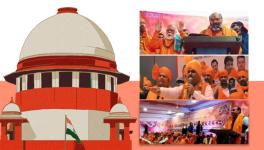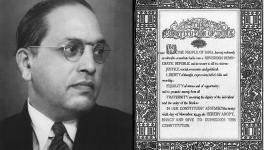SC Reserves Order on Interim Plea Seeking Stay on the Sale of Electoral Bonds Ahead of Assembly Polls

Image Courtesy: Wikimedia Commons
The Supreme Court Wednesday reserved orders on an interim application seeking to stay a further opening of the window for the sale of electoral bonds ahead of the scheduled state elections in West Bengal, Tamil Nadu, Kerala, and Assam.
Appearing for the NGO ‘Association For Democratic Reforms (ADR), advocate Prashant Bhushan submitted that the sale of an electoral bond would further increase the illegal and illicit funding of political parties through shell companies.
Bhushan added that the Election Commission (EC) on 25.05.2018 and the Reserve Bank of India (RBI) vide letters on 31.01.2017, 14.09.2017, 27.09.2017 had objected to electoral bonds and had advised against issuing them as a mode for donation to political parties.
An electoral bond, Bhushan argued, is like cash to a political party for a quid pro quo. Bhushan contended that electoral bonds were anonymous to others but not to the government which would know who the donor was as the State Bank of India (SBI) came under the purview of the Centre. Therefore, he argued that if the government wished to victimise a donor for donating to opponent parties, it could do so as it would know the identity of the donor.
Bhushan went on to point out how the Finance Bill, 2017, which paved the way for the introduction of the electoral bond scheme, was passed as a money bill since the government did not have a majority in the Rajya Sabha then. He said the electoral bond scheme went at the heart of democracy.
CJI Bobde, at this point, told Bhushan that if his arguments were correct, the court would have to strike down the law. “How do we decide this in an interim application?” he asked.
Bhushan, in response, said the main petition had challenged the very Act. He also alleged that not all political parties were complying with the court’s previous order directing all political parties to give details of donors who contributed through electoral bonds as well as the amount received from them to the Election Commission of India (ECI) in a sealed envelope.
Senior advocate Rakesh Dwivedi, appearing for ECI, said he would need to seek instructions whether there had been non-compliance with the court’s order, but, he added, the main political parties had submitted details to EC.
CJI Bobde sought to know from Attorney General (AG) KK Venugopal why there was selective anonymity in this scheme. The court also sought to know from the AG whether the government was going to issue electoral bonds.
AG Venugopal replied that the scheme will be open from April 1-10, after permission was granted by the Election Commission. The AG contended that all payments for the issue of electoral bonds were accepted only by means of a demand draft, cheque or through the Electronic Clearing System or direct debit to the buyers’ account; “no black money can, therefore, be used for the purchase of these bonds”.
During the hearing, CJI Bobde red-flagged the “misuse” of funds by electoral bonds for activities such as terrorism and violence. Solicitor General Tushar Mehta, however, said it was not possible as political parties with at least 1% vote share only could take electoral bonds.
The Election Commission said it did not oppose it because it did not want to return to the old system where cash was used. It, however, submitted it wanted more transparency in the scheme.
In 2017, a batch of petitions was filed challenging certain amendments made through the Finance Act, 2017 and earlier Finance Act, 2016, both passed as money bills, which had opened the doors to political donations, even from foreign companies.
The pleas argued that it legitimized electoral corruption at a huge scale, while at the same time ensuring complete non-transparency in political funding. The challenge to those amendments via Finance Act is still pending.
This article was first published in The Leaflet.
Get the latest reports & analysis with people's perspective on Protests, movements & deep analytical videos, discussions of the current affairs in your Telegram app. Subscribe to NewsClick's Telegram channel & get Real-Time updates on stories, as they get published on our website.
























